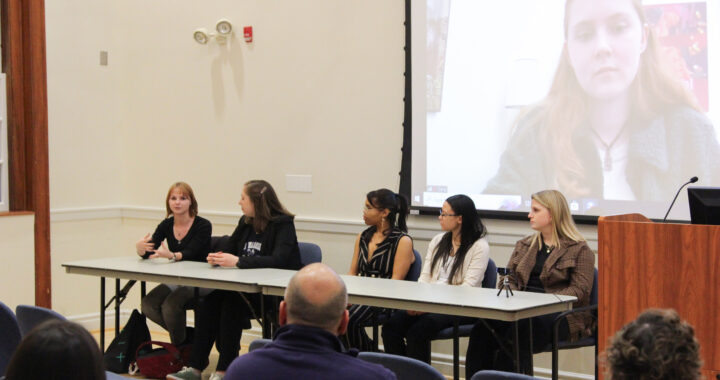Graduates Strike Out in Job Search
4 min readAfter four years of hard work and lectures, many college students are finding that their biggest test is finding a job after graduation.
The current job market has limited the opportunities of internships and full-time jobs that once lay in front of matriculating seniors. According to CBS News, only one in five college graduates in 2009 left school having a job, compared to one in two graduates with jobs in 2007.
The New York Times reported similar statistics from the Economic Policy Institute, stating that the unemployment rate for college graduates under the age of 27 has increased to 7.1 percent, almost double the rate in 2007.
These national statistics are hitting close to home for students at Mary Washington.
“A lot of the jobs that would normally go to college graduates are being given to experienced, middle-aged people who have lost their jobs,” class of 2009 graduate Quela Carlson said. “They are fighting just as hard as we are for entry-level jobs.”
“I am positive the qualifications for simpler jobs have been getting stricter and tougher because employers are realizing people are more desperate to be employed,” 2009 graduate Julia Munzert said. “I have seen several secretarial jobs—not even corporate assistants or anything—that have required Ph.D.s.”
However, many faculty members are citing the benefits of unpaid alternatives.
“The ideal situation would be having an internship prior to graduation,” Director of Career Services Gary Johnson said.
Johnson explained that this increases the student’s marketability to all employers while improving their resume, as well as building connections with potential employers even if they don’t stay with the same company.
“I would recommend that [students] pursue internships or consider training programs or workshops to learn specific skills or earn certifications,” Brooke Donaldson, assistant professor of French, said. “As part of the government stimulus program, the Workforce Investment Board and many companies have received money to provide such services.”
Despite the challenging job market, many employers are still recruiting on campus with events like last Thursday’s Career Fair, sponsored by the Office of Career Services. Over 60 employers sent representatives to the Great Hall, where they were able to answer questions, network, and find potential hires.
However, these employers are not able to hire as many students as they were in previous years. Lauren Andrews, a human resources representative from an accounting firm in Richmond, said the firm was only offering five positions this year, as opposed to 10 last year.
“Our current interns are getting the job offers,” she said. “The students aren’t getting as many offers as usual.”
Andrews graduated from UMW in 2005 with a bachelor’s degree in English, and said she knows how hard it is to find a job in today’s economy. She said within their firm, the positions are very competitive and the desired GPA has increased tremendously.
“Focus on extracurriculars and try to get as much experience under your belt as possible,” she advised.
However, not all companies saw a decrease in the amount of people they were able to hire. All of the government-affiliated businesses are remaining consistent.
“Stick with the government—we’re stable,” said Amanda MacDonald, an auditor with the US Department of Education.
MacDonald went on to explain that the Recovery and Reinvestment Act, an economic stimulus bill enacted in February, has greatly helped the permanence of government jobs.
Johnson said that the government was “hiring significant numbers” of people and the jobs were “very competitive.”
Several students are also looking further into the alternative of graduate school. At George Washington University in Washington, DC, the student-run newspaper the Hatchet reported in January that graduate applications were up 7 percent in the past year.
Similarly, Duke University reportedly had a 33 percent increase in graduate applications, according to USNews.com.
“I am deciding if I will be going to graduate school and working or just working, which will affect what kind of job I pursue [after graduation],” Margaux DeLong, a UMW senior, said.
Donaldson made this observation as well.
“Rather than choosing graduate school as an alternative, more students are resigning themselves to the fact that they may well have to start with a temporary or less-than-ideal job before settling into something more permanent and/or desirable,” Donaldson said.
While the job market may be thin right now, employers and faculty encourage students to keep trying, no matter what setbacks they may face.
“Be open to all jobs, consider all possibilities,” Johnson advised. “You’ll have the best luck with some flexibility.”
He said that he hopes the class of 2010 will not face difficulties in finding employment to the same degree as the class of 2009, as they are beginning to see more job listings and more requests from employers to be listed.
“Hopefully for this graduating class, the job market will continue to improve,” he said.
“Be patient and persistent and [don’t] be discouraged,” Donaldson said, “[you] are certainly not alone.”











